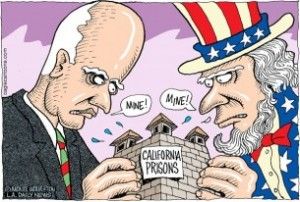More parolees hit CA streets
by James Poulos | May 30, 2014 10:09 am
 Whether young or old, increased numbers of paroled convicts are rejoining California society. A new high court ruling likely will decrease life-without-parole prison sentencing for juvenile offenders. State parole boards are substantially increasing recommendations for release. And Gov. Jerry Brown is facilitating the new approach amid an ongoing effort to comply with several controversial U.S. Supreme Court decisions.
Whether young or old, increased numbers of paroled convicts are rejoining California society. A new high court ruling likely will decrease life-without-parole prison sentencing for juvenile offenders. State parole boards are substantially increasing recommendations for release. And Gov. Jerry Brown is facilitating the new approach amid an ongoing effort to comply with several controversial U.S. Supreme Court decisions.
In early May, the California Supreme Court handed down a unanimous ruling that allows[1] judges to opt against denying juveniles the possibility of parole, based on their age and the seriousness of their crimes. That decision cuts against lower courts, which have long assumed that justices should favor sentences of life without parole for juveniles convicted of murder with especially heinous or so-called “special” circumstances.[2]
At the same time, release on parole continues a steady climb in California. In just the past five years, over twice as many convicts serving life sentences have been paroled[3] than in the last two decades combined, according to The California Report. Meanwhile, Gov. Brown has stood clear of some 80 percent of state parole recommendations. A third of “lifers” facing parole hearings now receive parole, as a result of several wide-reaching events.
Brown has struggled for years with lawsuits trying to force change on the California prison system. Brown’s administration faced allegations of constitutionally unjustifiable overcrowding, which culminated in a 2011 U.S. Supreme Court ruling against him in the Brown vs. Plata case[4].
By this year, Brown was able to secure[5] two years more time to meet criteria used to show overcrowding has been adequately reduced. Nevertheless, as NPR reports[6], parole is one effective way to reduce prison populations, which Sacramento officials have been especially keen to do in the wake of Swarthout vs. Cooke[7], a separate U.S. Supreme Court decision handed down in 2011. Brought up on an appeal of a California verdict, the case resulted[8] in tougher standards for denying parole to inmates no longer considered dangerous.
Shifting perspectives on crime
Some of the anecdotal evidence is encouraging when it comes to the real-life impact of parole on life sentences. But more broadly, these developments come at an uneasy time. California parole officials were recently humiliated[9] when two sex offenders who had been granted parole wound up allegedly killing at least four women while subject to “close” state or federal monitoring.
Then, the shocking Isla Vista shootings by University of California, Santa Barbara student Elliot Rodger[10] stoked fears that complicate the issue of parole. California already faces significant debates surrounding juvenile crime, mental illness, access to guns, government monitoring and recidivism.
In an added wrinkle, differing opinions on criminal justice reform don’t match up with party lines. Sacramento Democrats, for instance, are divided over whether to tighten the state’s already stringent gun-control laws even further. California’s restrictions are among the severest in America. But in the wake of Isla Vista, three state Democrats are pushing for a new measure.
A so-called “gun violence restraining order” is being advanced[11] by Assemblyman Das Williams, D-Santa Barbara; Assemblywoman Nancy Skinner, D-Berkeley; and state Sen. Hannah-Beth Jackson, D-Santa Barbara. Their proposed legislation would permit individuals to warn courts and law enforcement that they’re worried a friend of family member might become violent.
As the New York Times reports, leading Democrats are wary[12] of the move, even though gun-control activists have taken up the “restraining order” cause in the legislatures of states like Connecticut, Indiana and Texas.
While Brown has a mixed record of signing some gun-control laws while vetoing others, state Sen. Darrell Steinberg, D-Sacramento, told the Times his fellow Democrats’ proposal has a “potential for abuse.” New legislation along the lines they support “would have to be very carefully crafted,” he cautioned, “because you do not want the law to get into the middle, or just to be used as a pretext or excuse for leverage in an intergenerational family fight.”
Liberalized parole laws create the same possibility for potentially dangerous gray areas. On the other hand, they have also been shown to begin the process of rehabilitation into society that even tough-on-crime advocates tend to support. As California’s growing parolee population returns to public streets and private homes, their actions may shape public opinion more quickly than lawmakers themselves.
- allows: http://www.latimes.com/local/la-me-juveniles-20140506-story.html
- “special” circumstances.: http://law.onecle.com/california/penal/190.2.html
- paroled: http://www.californiareport.org/archive/R201405161630/b
- Brown vs. Plata case: http://www.supremecourt.gov/opinions/10pdf/09-1233.pdf
- secure: http://www.nytimes.com/2014/02/11/us/court-gives-california-more-time-to-ease-prison-crowding.html
- reports: http://www.npr.org/2014/05/26/315259623/in-california-life-with-parole-increasingly-leads-to-freedom
- Swarthout vs. Cooke: http://www.supremecourt.gov/opinions/10pdf/10-333.pdf
- resulted: http://www.supremecourt.gov/opinions/10pdf/10-333.pdf
- humiliated: http://www.latimes.com/local/lanow/la-me-ln-parole-officials-accused-serial-killers-20140513-story.html
- shootings by University of California, Santa Barbara student Elliot Rodger: http://abcnews.go.com/US/parents-santa-barbara-killer-distraught-speech-stuttered/story?id=23908059
- advanced: http://www.latimes.com/local/political/la-me-pc-gun-violence-restraining-order-20140527-story.html
- wary: http://www.nytimes.com/2014/05/29/us/in-wake-of-mass-shooting-a-gun-bill-is-pushed-in-california.html?hpw&rref=us
Source URL: https://calwatchdog.com/2014/05/30/more-parolees-hit-ca-streets/